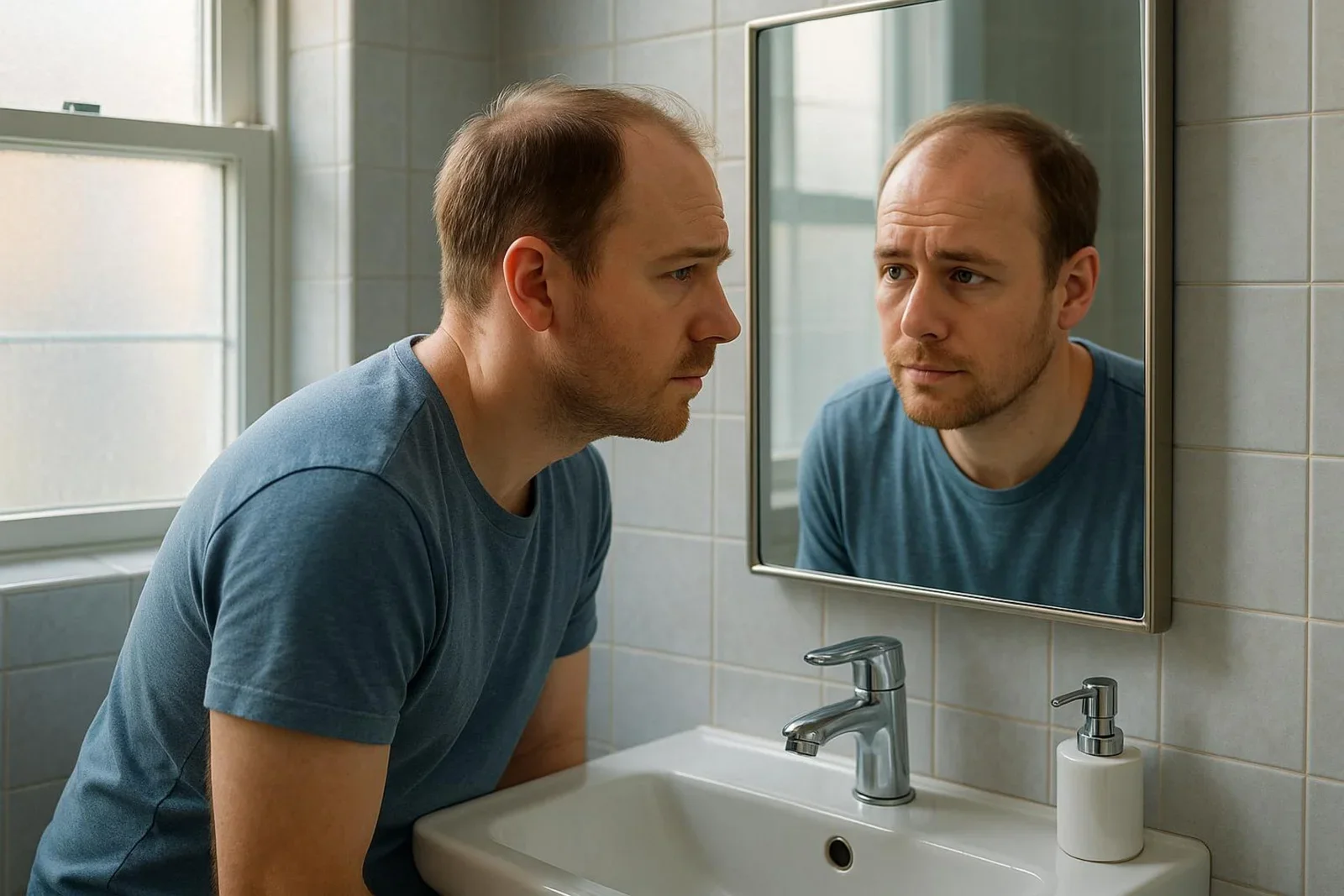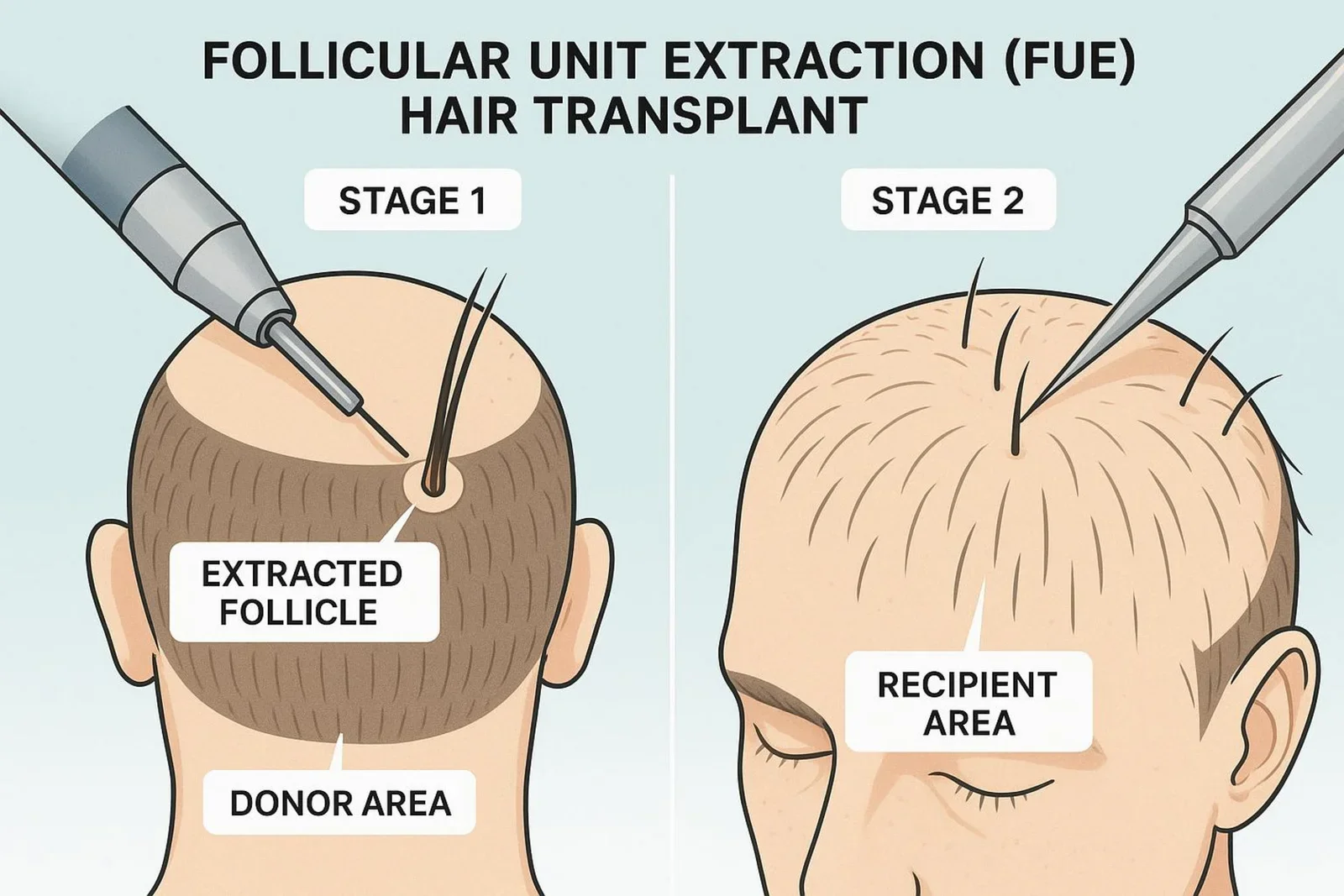Hair Loss Prevention: Tips for Men
Many men in Australia and around the world worry about hair loss. While your genes are a big factor in whether you lose hair, there are practical steps you can take to slow the process and help keep your hair healthy. Knowing why hair loss is happening is the best way to find the right treatment and slow things down.
This article looks at several ways to deal with hair loss-from changes you can make in your daily life and natural remedies, to medical treatments and surgical options. We’ll explain why men lose hair, early signs to look for, and a wide range of methods to help you keep your hair longer. If you want clear, easy-to-follow information about stopping hair loss, this guide will help.
Why Do Men Lose Their Hair?
Main Reasons for Male Hair Loss
Men lose hair for many reasons, and not everyone has the same cause. It’s normal to lose up to 100 hairs a day as part of your natural growth cycle. If you start losing more than that and don’t see new hair coming in, it’s called alopecia.
The most common cause is called male pattern baldness or androgenetic alopecia. This type is passed down from your family and is affected by a hormone called DHT. Other things-like health problems, some medicines, and everyday habits-can also cause hair loss. Finding out exactly why you’re losing hair is important, as it helps you choose the right plan to stop or slow it.
The Role of Genetics and Family
Most men with hair loss have someone in the family who has lost their hair too. If your father or grandfather had hair loss, you’re more likely to have it as well. This happens because your body is sensitive to DHT, which can shrink down your hair follicles-making hair thinner, weaker, and shorter each time. Eventually, these small hairs may stop growing altogether.
This usually starts with a receding hairline (going back at the temples), or thinning hair on the crown (top) of your head. Sometimes it makes a ring or “horseshoe” of hair around the sides and back. You can’t change your DNA, but knowing your family history is helpful for catching the problem early and deciding what to do next.
The Effect of Health Problems and Medicines
Other than family history, certain illnesses and drugs may cause hair to fall out. Problems with the thyroid (either too much or too little hormone) can stop hair from growing normally. Autoimmune diseases like alopecia areata, where the immune system attacks hair roots, can cause spotty hair loss. Fungal infections, such as ringworm, can also lead to hair loss with redness or sores on the scalp.
Some medicines can make hair fall out. This includes drugs for high blood pressure, depression, arthritis, and cancer treatments like chemotherapy. If you think a health issue or medicine is causing your hair loss, see your doctor for a check-up.
How Lifestyle Can Lead to Thinner Hair
What you eat and how you live affects your hair. If your diet is poor and lacks important nutrients-such as iron, vitamin D, B vitamins, or protein-your hair can get thin and fall out. These nutrients are needed for your hair and scalp to stay healthy.
Ongoing stress is another main trigger. Too much stress can disrupt the normal way hair grows and speeds up hair shedding. Stress chemicals can lower blood supply to the scalp and upset the function of your hair roots. Other habits like smoking or rough hair styling also damage hair over time.
Early Signs That You May Lose Hair
Spotting Male Pattern Baldness
Male pattern baldness often starts slowly, so it’s easy to miss at first. Watch for your hairline creeping back at the temples, sometimes making an “M” shape as your forehead looks bigger.
Hair might also get thin at the top (the “crown”). You’ll notice your scalp is easier to see or your hair part looks much wider. Spotting these changes early is helpful, as treatments can slow loss and maybe even help hair grow back.
Noticeable Hair Shedding or All-Over Thinning
It’s normal to lose 50-100 hairs a day, but if you see a lot more in your shower, pillow, or brush, it could be a warning sign. Also, if your hair starts to feel less thick everywhere or your scalp becomes more visible, pay attention. This kind of thinning could point to stress, diet problems, or other conditions besides male pattern baldness.
Everyday Changes to Help Prevent Hair Loss
Eating the Right Foods for Healthier Hair
Your hair is mainly made from protein, so eating protein-rich foods helps keep it strong. Focus on lean meats (like chicken, fish), eggs, and legumes. Make sure you’re also getting enough iron (from red meat, spinach, nuts, seeds) and zinc, both of which help hair grow and keep you from losing more.
Vitamins A, C, and E protect hair, keeping it healthy. Eat brightly colored fruits and vegetables such as sweet potatoes and citrus fruits. B vitamins, especially biotin, are also helpful for growing hair. Try to get your nutrients from whole foods instead of relying too much on supplements. Diets high in raw vegetables and fresh herbs-like the Mediterranean diet-may lower your risk of hair loss. Avoid crash diets that cut out important nutrients, as these can trigger shedding.
| Nutrient | Helps With | Food Sources |
|---|---|---|
| Protein | Hair strength | Meats, eggs, legumes |
| Iron | Prevents shedding | Red meat, spinach, seeds |
| B Vitamins | Growth cycle | Whole grains, eggs |
| Vitamin D | Controls growth | Sunlight, fish, fortified foods |
Regular Exercise and Better Blood Flow
Exercise boosts blood flow, which helps nutrients reach your scalp and hair roots. This can wake up hair follicles and encourage growth. Even simple activities like a daily walk or gym workout can make a difference. Exercise also lowers stress, which helps stop stress-related hair loss.
Controlling Stress to Limit Hair Loss
Stress can push hair into a “resting” phase, causing heavy shedding. To prevent this, use techniques like meditation, yoga, breathing exercises, or just spending time on hobbies. These activities relax your body and reduce stress hormone levels, which can help your hair stay on a normal growth cycle.
Good Sleep and Your Hair
Getting enough sleep-about 7 to 8 hours each night-helps your whole body heal and keeps hormone levels stable. Poor sleep can lead to more stress and hair loss. When you’re well rested, your body is better at managing stress, which also supports healthy hair growth.
Care Tips for Your Hair and Scalp
Gentle Washing and Cleaning
Be gentle when washing your hair. Use a mild shampoo, free from harsh chemicals like sulphates, so you don’t strip away natural oils. Massage your scalp softly with your fingertips, not your nails. Don’t over-wash or scrub too hard. Always use conditioner on your hair’s middle and ends to reduce breakage.
Limiting Heat and Chemical Damage
Too much heat from hairdryers, straighteners, or curling irons can make hair dry and weak. Try to air-dry when you can. If you must use heat tools, limit them to once or twice a week and use a spray that protects your hair from heat. Chemical treatments like coloring, bleaching, or perming can also harm your hair. If you notice thinning, avoid these treatments, or at least have them done by a professional who uses gentle products.
Scalp Massage for Better Hair Growth
Massaging your scalp gently helps bring more blood (and nutrients) to your hair follicles. It can also help you relax. Use your fingers or a simple scalp massager; you can also add a few drops of oils such as coconut or olive oil for extra nourishment. Try to do this for a few minutes every day.
Picking the Right Hair Products
Pick gentle shampoos and conditioners, especially ones made for thinning hair. Stay away from products with a lot of alcohol or strong fragrances, as they can dry out scalp and hair. If you use styling products, go for lightweight options like mousse or spray-heavy gels and waxes can weigh hair down and clog follicles.
Natural Treatments and Supplements
Key Vitamins and Minerals
Getting enough iron and zinc can help stop hair loss and support growth. Vitamin D, B vitamins (especially biotin), and vitamins A, C, and E all help keep your scalp and hair healthy. If your diet isn’t giving you what you need, you can try a daily multivitamin, but check with a doctor first. Too much of certain vitamins can also be harmful.
About Biotin, Saw Palmetto, and Ginseng
Biotin is good for hair but mostly helps if you already have a deficiency. Saw palmetto may help slow hair loss caused by male pattern baldness by blocking the enzyme that raises DHT. Ginseng could also help hair growth by making follicles more active. More research is still needed on these natural supplements, and you should talk to your doctor before trying them.
Essential Oils and Scalp Treatments
Oils like rosemary or peppermint can help improve scalp blood flow and may aid hair growth. Always mix essential oils with a carrier oil before putting them on your skin. You can also use scalp scrubs to clear away old skin, extra oil, and product buildup, keeping your scalp healthy for new hair to grow.
Medical Options for Hair Loss
Medicines: Minoxidil and Finasteride
Two well-known hair loss medicines are minoxidil (a liquid or foam you put on your scalp) and finasteride (a pill). Minoxidil increases blood flow to your scalp and helps hair stay in its growth phase. It’s sold over the counter. Finasteride blocks DHT, which causes most male pattern baldness, and is available by prescription only. Both need regular, long-term use to see results:
| Medication | How You Use It | Possible Side Effects |
|---|---|---|
| Minoxidil | Rub onto scalp | Scalp irritation, rare heartbeat issues |
| Finasteride | Daily pill | Sexual side effects, not for use by women |
Laser and Growth Factor Treatments
Treatments like Platelet-Rich Plasma (PRP) involve injections into the scalp using your own blood to help hair grow. Low-level laser therapy (LLLT) uses red light to stimulate hair follicles. Both are mostly used for mild to moderate hair loss and work better if used regularly over months.
Hair Transplant Surgery
If hair loss is advanced, a hair transplant could be the right choice. The most common type is Follicular Unit Extraction (FUE). With FUE, individual hairs are taken from the sides or back of your head and placed where you need them. This is usually permanent, but your existing hair will still need care to prevent further loss.
Side Effects and Safety
All hair loss treatments can have side effects. Minoxidil might irritate your scalp, and finasteride can bring sexual side effects, which often go away if you stop using the medicine. PRP and other injection treatments can cause swelling or bruising. Surgery has risks like infection or scarring. Always talk to your doctor before starting a treatment-they can help you understand what’s safest for your situation.
When Should You See a Professional?
Seeing a Doctor or Hair Loss Expert
If your hair starts falling out quickly, in patches, or all over, it’s time to get medical advice. Your regular doctor can order blood tests to look for causes like thyroid issues or vitamin shortages, and review your current medicines.
If your case is tricky, your doctor might send you to a dermatologist or hair loss specialist. These experts can give a more detailed assessment and recommend the best treatment-whether medication, lifestyle changes, or surgery.
What to Ask Your Doctor
What is causing my hair loss?
Are any of my current medicines involved?
What treatment works best for my type of hair loss?
What are possible side effects?
How long will it take to see results?
Am I a good fit for a hair transplant?
What can I do at home to support treatment?
Bring a list of questions to make sure you get all the information you need.
Frequently Asked Questions
Can I reverse male hair loss?
Some forms of hair loss can be slowed or partly reversed, especially if you act quickly. Medicines like minoxidil and finasteride work best started early, while temporary hair loss from stress or nutrition usually grows back once the problem is fixed. Hair transplants are permanent for advanced cases.
How long until I see results from treatment?
You’ll need patience. Most treatments take 3-6 months before results show, and full effects can take up to a year. Be consistent and stick to the plan even if you don’t see changes right away.
Are hair loss medicines safe?
Most are safe for many people, but all can cause side effects. Minoxidil can cause irritation, dryness, or rarely, more serious symptoms if absorbed too much. Finasteride can cause changes in sexual function, usually ending when you stop taking it. Always check with your doctor before starting treatment.
Are hair transplants final?
Yes, transplanted hair is considered permanent and will continue to grow. However, the remaining hair you have can still thin out later, so continue a good hair care routine and, if advised, use medication to keep the rest of your hair healthy.
Does stress really cause hair loss?
Yes, stress can cause hair to shed all at once after a difficult period. This type of hair loss is usually temporary and can get better once the stress is gone, but ongoing stress can make things worse. Keep stress under control with regular relaxation and exercise.
Summary: Main Points for Preventing Hair Loss
Dealing with hair loss may seem tough, but there are many simple and effective ways to slow it down or prevent it. The most important thing is to find out why you’re losing hair. Whether it’s your genes, health conditions, or habits, knowing the cause helps you choose what works best.
A healthy diet, less stress, and better sleep all help support your hair and body. Combine these habits with gentle hair care and, if needed, proven medicines. Newer treatments, like lasers or PRP, give more options. For a lasting answer, hair transplants can bring back real hair. Whatever path you choose, be patient and stay consistent. If you’re unsure, talk to a doctor to find what works best for you-so you can keep your hair healthier for years to come.
Do you live in Sydney?
Get the perfect look at our salon – schedule your appointment now!
Our Services
Check Out Our Instagram
Check out our instagram
Check out our instagram and see our latest posts!
Check out our facebook
Check out our facebook and see our latest
posts!











